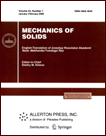 | | Mechanics of Solids
A Journal of Russian Academy of Sciences | | Founded
in January 1966
Issued 6 times a year
Print ISSN 0025-6544
Online ISSN 1934-7936 |
Archive of Issues
| Total articles in the database: | | 13427 |
| In Russian (Èçâ. ÐÀÍ. ÌÒÒ): | | 8178
|
| In English (Mech. Solids): | | 5249 |
|
| << Previous article | Volume 52, Issue 3 / 2017 | Next article >> |
| A.G. Petrov, "Rotation of the Apparent Vibration Plane of a Swinging Spring at the 1:1:2 Resonance," Mech. Solids. 52 (3), 243-253 (2017) |
| Year |
2017 |
Volume |
52 |
Number |
3 |
Pages |
243-253 |
| DOI |
10.3103/S0025654417030025 |
| Title |
Rotation of the Apparent Vibration Plane of a Swinging Spring at the 1:1:2 Resonance |
| Author(s) |
A.G. Petrov (Ishlinsky Institute for Problems in Mechanics of the Russian Academy of Sciences, pr. Vernadskogo 101, str. 1, Moscow, 119526 Russia, petrovipmech@gmail.com) |
| Abstract |
Nonlinear spatial vibrations of a mass point on a weightless elastic suspension (pendulum on a spring) are considered. The frequency of vertical vibrations is assumed to be equal to the doubled swinging frequency (the 1:1:2 resonance). In this case, as numerical calculations and experiments show, the vertical vibrations are unstable, which leads to the vertical vibration energy transfer to the pendulum swinging energy. The vertical vibrations of the mass point decay and, after a certain time period, the pendulum starts swinging in a certain vertical plane. This swinging is also unstable, which results in the reverse energy transfer into the vertical vibration mode. The vertical vibrations are again repeated. But after the second transfer of the vertical vibration energy to the pendulum swinging energy, the apparent plane of vibrations rotates by a certain angle. These effects are described analytically; namely, the energy transfer period, the time variations in the amplitudes of both modes, and the variations in the angle of the apparent vibration plane are determined.
An asymptotic solution is also constructed for the mass point trajectory in the orbit elements. In projection on the horizonal plane, the mass point moves in a nearly elliptic trajectory. The ellipse semiaxes slowly vary with time, so that their product remains constant, and the major semiaxis slowly rotates at a constant sectorial velocity. The obtained analytic time dependence of the ellipse semiaxes and the precession angle agree well with the results of numerical calculations. |
| Keywords |
swinging spring, resonance, vibration plane rotation |
| References |
| 1. | A. A. Vitt and G. S. Gorelik,
"Elastic Pendulum Oscillations as an Example of Oscillations Two Parametrically Connected Linear Systems,"
Zh. Tekhn. Fiz.
3 (2-3), 294-307 (1933). |
| 2. | G. S. Gorelik,
Oscillations and Waves
(Fizmatilit, Moscow, 1959)
[in Russian]. |
| 3. | E. Fermi,
"Über den Ramaneffect des Kohlendioxyds,"
Zs. F. Phys.
71 (23), 250-259 (1931). |
| 4. | V. M. Starzhinskii,
Applied Methods of Nonlinear Vibrations
(Nauka, Moscow, 1977)
[in Russian]. |
| 5. | M. N. Zaripov and A. G. Petrov,
"Nonlinear Vibrations of a Swinging String,"
Dokl. Ross. Akad. Nauk
399 (3), 347-352 (2004)
[Dokl. Phys. (Engl. Transl.)
49 (11), 691-696 (2004)]. |
| 6. | A. G. Petrov,
"Nonlinear Vibrations of a Swinging Spring at Resonance,"
Izv. Ross. Akad. Nauk. Mekh. Tverd. Tela,
No. 5, 18-28 (2006)
[Mech. Solids (Engl. Transl.)
41 (5), 13-22 (2006)]. |
| 7. | A. G. Petrov and M. M. Shunderyuk,
"On Nonlinear Vibrations of a Heavy Mass Point on a Spring,"
Izv. Ross. Akad. Nauk. Mekh. Tverd. Tela,
No. 2, 27-40 (2010)
[Mech. Solids (Engl. Transl.)
45 (2), 176-186 (2010)]. |
| 8. | A. G. Petrov and A. V. Fomichev, "Nonlinear 3D Vibrations of a
Heavy Mass Point on a Spring at Resonance," Izv. Ross. Akad. Nauk.
Mekh. Tverd. Tela, No. 5, 15-26 (2008) [Mech. Solids (Engl. Trans)
43 (5), 698-708 (2008)]. |
| 9. | V. Ph. Zhuravlev,
"Invariant Normalization of Non-Autonomous Hamiltonian Systems,"
Prikl. Mat. Mekh.
66v(3), 356-365 (2002)
[J. Appl. Math. Mech. (Engl. Transl.)
66 (3), 347-355 (2002)]. |
| 10. | A. G. Petrov,
"Symmetrization of Hamiltonians,"
in Theoretical Mechanics, Collected papers, No. 29
(Izdat. MPI, Moscow, 2015),
pp. 66-76
[in Russian]. |
| 11. | V. Ph. Zhuravlev, A. G. Petrov, and M. M. Shunderyuk,
Selected Problems of Hamiltonian Mechanics
(Lenand, Moscow, 2015)
[in Russian]. |
| 12. | E. T. Whittaker and G. N. Watson,
A Course of Modern Analysis, Part 2
(Gos.-Tekh.-Teor. Izdat., Moscow, 1934)
[in Russian]. |
| 13. | A. G. Petrov,
"Invariant Normalization of Non-Autonomous Hamiltonian Systems,"
Prikl. Mat. Mekh.
68 (3), 402-413 (2004)
[J. Appl. Math. Mech. (Engl. Transl.)
68 (3), 357-367 (2004)]. |
| 14. | V. Ph. Zhuravlev,
"A Controlled Foucault Pendulum as a Model of a Class of Free Gyros,"
Izv. Ross. Akad. Nauk. Mekh. Tverd. Tela,
No. 6, 27-35 (1997)
[Mech. Solids (Engl. Transl.)
32 (6), 21-28 (1997)]. |
|
| Received |
27 January 2016 |
| Link to Fulltext |
|
| << Previous article | Volume 52, Issue 3 / 2017 | Next article >> |
|
 If you find a misprint on a webpage, please help us correct it promptly - just highlight and press Ctrl+Enter If you find a misprint on a webpage, please help us correct it promptly - just highlight and press Ctrl+Enter
|
|

 Russian
Russian  English
English